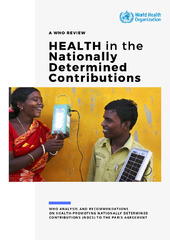Health, Climate Change and NDCs
Climate change poses significant risks to human health and health systems. Health risks include increased injuries and deaths from disasters, higher rates of heat-related mortality, vector-borne, waterborne and foodborne diseases, mental health stresses, forced migration, and conflict. Extreme weather events can damage health infrastructure and disrupt services causing further threats to public health. Fossil fuel combustion is one of the largest contributors to the 7 million deaths from ambient and household air pollution each year.
Given the health impacts of climate change, climate action can have significant health benefits in both the short and long-term. Understanding the potential contribution of both mitigation and adaptation action to protecting human health and health systems allows policy-makers to leverage potential health gains and associated health savings into ambitious, well designed NDC commitments that both preserve the planet and advance human health, well-being and sustainable development.
Call to Countries
WHO, in collaboration with leading researchers, will be making technical support available to countries to strengthen the inclusion of health in their NDCs by conducting a study to quantify the potential health co-benefits of national climate mitigation commitments.
The aim is to generate reliable country-level estimates of health gains and health savings associated with emissions reduction policy options (e.g. in the energy, transport and agricultural/food system sectors). If possible, a cost benefits analysis may also be conducted. As such, the findings will highlight the health implications of climate change for policy-makers within and outside the health sector and enable greater engagement of the health community in decision making and advocacy around raising ambition in NDCs. WHO will bring together leading experts in modelling of health co-benefits of climate mitigation to provide direct technical support to national health stakeholders.
The study timeframe will be in line with the 2020 NDC revision period.
Criteria for selection for this activity would include:
- The country is undertaking a revision of their NDC in 2020
- There is an expressed interest from the Ministry coordinating the NDC revision and the Ministry of Health to consider inclusion of health co-benefits in the NDC; (iii) feasibility of study (data availability, established modelling framework to respond to study question, etc.
- Selection process will aim to have representation of countries from a range of WHO regions
- Preference will be given to low and middle income countries (according to the World Bank income group country classification)
Process to become involved
An expression of country interest must be submitted by Ministry coordinating NDC revision and focal point of WHO in Ministry of Health to the WHO Secretariat by March 10, 2020 for inclusion in this initiative. See enclosed expression of interest form for further details.
Expressions of interest should be submitted using the attached form to:
Tara Neville
Climate and Health Team, World Health Organization
Timeline
Findings and outcomes from this initiative will be presented at the Global Conference on Climate Change and Health, November 14-15, 2020 and at United Nations Framework Convention on Climate Change, 26th session of the Conference of the Parties (COP26), November 2020, Glasgow, Scotland.
Financial support
Financial support, of approximately 50,000 USD per country, is available for a limited number of countries that participate in this call and that meet the selection criteria. This funding will be available for in-country study-related activities and external technical support administered through WHO offices.
Funding for this initiative is provided in part by the Wellcome Trust.
Of note, in addition to this specific call, WHO will continue to provide technical support on health inclusion in NDCs, building health system resilience to climate change and assessment of the health co-benefits of mitigation action through the Climate Action Enhancement Package (CAEP) and country engagement work of NDC partnership and WHO country projects on health and climate change.

